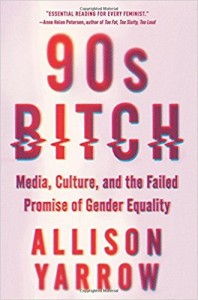The Lilith Blog 1 of 2
June 20, 2018 by Sarah M. Seltzer
The Bitches of the 1990s Weren’t Villains After All
 “Jews are really good at knowing our history,” says Allison Yarrow, author of the new book 90s Bitch, which casts a critical eye on the gender politics of the Clinton years, from Monica Lewinsky to Marcia Clark, examining how the rise of the 24/7 media landscape turned them into villains, pushing sexism and silencing into the air we breathe today.
“Jews are really good at knowing our history,” says Allison Yarrow, author of the new book 90s Bitch, which casts a critical eye on the gender politics of the Clinton years, from Monica Lewinsky to Marcia Clark, examining how the rise of the 24/7 media landscape turned them into villains, pushing sexism and silencing into the air we breathe today.
“We need to know the real history of what happened in the 1990,” Yarrow told Lilith, during a chat that covered Bill Clinton’s non-apology, the limits of nostalgia, the Sex and the City anniversary and of course, the word “bitch.”
SMS: Looking back on the 1990s, it seems at first like a good decade for women. So what punctured your nostalgia?
AY: Returning to the decade, I began with a lot of nostalgic memories from my childhood. I loved TLC and Lauryn Hill and Brenda from “90210!” I had a sneaking suspicion that women like Anita Hill and Monica Lewinsky and people in the headlines–there was something “wrong” with them. What I came to uncover was that was not the case. These women were what I called “bitchified”—undermined and objectified, their progress thwarted by emerging media narrative that called them bitches and every derivative. The sexism was shocking to uncover.
SMS: Monica Lewinsky and Bill Clinton were back in the news in the wake of “Me Too.”How much have things changed since the scandal’s heyday?
I am encouraged to see Monica Lewinsky out in the world using her voice and having a voice. What’s so notable about the coverage of the Lewinsky scandal at the time, is that all of us can close our eyes and hear Bill Clinton’s voice in our heads, but few of us can even call up in our minds what Lewinsky’s voice actually sounds like. Part of that of course is because Clinton is the president of the United States, but we remember “I did not have sexual relations with that women” and we don’t know what she said.
In terms of what happened this month when Clinton recently made the rounds with the new James Patterson novel he co-wrote, there has been a lot of attention and concern about whether he apologized–whether he apologized at all, was his apology sufficient, what does he think now? It’s still about him.
But I’m more interested in people interrogating and investigating the past coverage that rendered a 21 and 22 year-old intern the predator and perpetrator of a sex scandal — with the President of the United States. From major news magazines to cable, even the straight-shooting news coverage of Lewinsky editorialized and contributed to a narrative that she was to blame.
A few weeks back there was a frenzy of coverage about the 20th anniversary of “Sex and the City.” Where does it fit in to the narrative of 90s women?
During the 90s there was a new kind of women emerging, a new archetype. For about 100 years, the median age of marriage swung between 22 and 23. But by late 90s it was the highest it had ever been. There was expanded access to birth control, and women were marrying later or not at all. More women going into the workforce. So you saw this effort to market to this new demographic, what articles about Victoria’s Secret called the “Cosmopolitan girl.” Even that– Victoria’s secret created this idea that lingerie was for recreation rather than just functional.
On top of that kind of marketing there was a new kind of woman on television. She was living in city, working a job, having sex outside of marriage. You saw it on shows like “Living Single,” “Ally McBeal,” and it kind of peaked with “Sex in the City.” It was a cultural shift—women as the independent agent in their own lives. You could see it through the tool of voiceover, allows you to get an intimate tour of what they were thinking, how they were acting. That’s why there was so much pushback and criticism.
Of course, what felt feminist 20 years ago doesn’t feel as feminist today. But the fact that women were in the driver’s seat telling their own stories is incredibly important for a generation of women.
How have people reacted to the word “Bitch” in the title of your book?
“Bitch” is in the title, but it’s not a promotion of the term. It’s a fact that in the 90s the word bitch and its cousins were used to undermine and malign women. The title speaks to that reality. And if we have a problem with that we need to look at it harder and change it.
 Please wait...
Please wait...